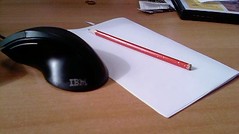
Image Credit Leeks
As readers of the blog know, Matt Koehler and I work together quite a lot. In fact we just rotate author-order in our papers since it is hard to keep track of individual contributions. (I would like to claim that the cool ideas are mine – but again he is bigger and stronger than me so I don’t often do that, at least not any more.) We are also huge fans of Douglas Adams and his Hitchhiker’s Guide to the Galaxy trilogy (which consists of 4 books, something that makes perfect sense if you have ever read Adams). Anyway, a bunch of years ago we decided that we needed to act on our love for this man, and his writings, by citing him in an academic paper. To our great pride, we did it! In fact we started the article with a citation to Adams.
Here is a citation to the article…
Koehler, M. J., Mishra, P., Hershey, K., & Peruski, L. (2004). With a little help from your students: A new model for faculty development and online course design. Journal of Technology and Teacher Education, 12(1), 25-55.
… and this is how the article began!
The late Douglas Adams (1997), author of The Hitchhiker’s Guide to the Galaxy, uncovered an important principle relevant to educational technology—The Someone Else’s Problem (SEP) field. The SEP is a fictional technology that can make something “virtually invisible” because we think it is somebody else’s problem. It is not that the object in question really vanishes. It does not. It may in fact even catch you by surprise out of the corner of your eye. The idea of the SEP is that once we consider something as being outside of the arena of our concerns, that something, for all practical purposes, ceases to exist.

Douglas Adams, image credit National Library Board, Singapore
How cool is that! Now, it turns out that our connections with Adams are even deeper than we knew. Recently we wrote another article…
Mishra, P., & Koehler, M. J. (2009, May). Too Cool for School? No Way! Learning & Leading with Technology, (36)7. 14-18. [PDF download].
… where we wrote the following:
Someone once suggested that technology is all the new stuff that appeared after we were born! The stuff that was around before we arrived on the planet we often take as a given. For instance, to most of us a car is not really a technology, while a website is. To children born in the 1990’s neither cars nor websites are examples of technology, iPods and Wii gaming systems are.

Image credit, from littledan77
Now I remember writing this sentence (or do remember first reading it in Matt’s draft?). The point is that when we wrote “Someone once suggested…” we didn’t really think that someone had suggested it. That was just a rhetorical move, a way of sounding credible and being modest all at the same time. But guess what? Douglas Adams did say something exactly like this – only better. In his last book…
Adams, D. (2002). The salmon of doubt: Hitchhiking the galaxy one last time. New York: Harmony Books.
… which is actually a collection of pieces he had written here and there I came across the following:
I’ve come up with a set of rules that describe our reactions to technologies:
- Anything that is in the world when you’re born is normal and ordinary and is just a natural part of the way the world works.
- Anything that’s invented between when you’re fifteen and thirty-five is new and exciting and revolutionary and you can probably get a career in it.
- Anything invented after you’re thirty-five is against the natural order of things. (p. 95).
Isn’t that just perfect! I now have another cool quote to use from Douglas Adams, and I don’t have to go the wimpy “Someone once suggested…” route.
The problem is that, I would still like Matt and me to take credit for this, I mean, so what if Douglas Adams wrote this years ago!, we came up with it independently (our weasel language notwithstanding). My colleague Patrick Dickson has a phrase he uses that I think may help solve our problem. According to him, we deserve full credit for the idea, because Adams committed “anticipatory plagiarism.” Dickson defines Anticipatory Plagiarism as occuring “when someone steals your original idea and publishes it a hundred years before you were born.”
Somewhat appropriately, and for some strange reason, the Interwebs claim that this definition of “anticipatory plagiarism” was first written by Robert Merton (for instance see this page). It is any surprise that Dickson is claiming anticipatory plagiarism by Merton!


Great…now I can read my favorite academic authors (PM and MK/ or MK and PM) along with my favorite fiction author, in the same article!…:). Keep quoting!
Thank you for your comment. To be called someone’s favorite academic author … now, that’s a compliment to treasure 🙂